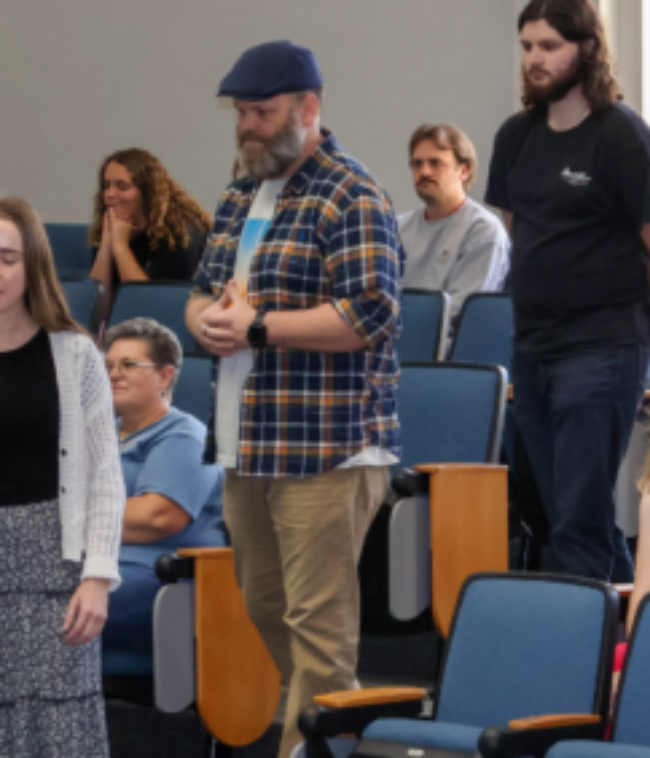Looking for Laborers – The Lead Ministers’ Role in Finding the Next Generation of Ministers
Sometimes it comes through email. Sometimes it’s a phone call. The basic question is the same. “This is (insert name) at (you pick) Christian Church. We are looking to hire a (you pick) minister. Do you have any names for me?” I have received plenty of emails and phone calls like this, as has other faculty and staff of both undergraduate and graduate programs. We are not the only ones. In talking with friends who teach at other institutions, they share the same experiences. There is a shortage of ministers and people going into ministry.
This dilemma is not facing just the Stone-Campbell movement. It is true for denominations and non-denominational churches. I have yet to come across anyone saying their “market” is flooded with clergy. Rather, the ground is dry, few clouds in the sky, and fewer still are dark with moisture.
This concern is not merely anecdotal. Research backs this up. In a 1992 study, George Barna discovered that the average age of Protestant pastors was 44 years of age.[1] In 2017, just twenty-five years later, the average age is 54. Barna goes on to report that in 1992, one in three pastors was under the age of 40 while in 2017 only one in seven was under the age of 40. In 1992 only 25% of pastors were over the age of 55. In 2017, more than half of all pastors were over the age of 55. Lest you think that this has only been a problem since the 90’s, consider that 55% of pastors in 1968 were under the age of 45. Again, by 1992 only one in three pastors was under the age of 40. The 70’s and 80’s were not great either.
There are multiple reasons for the graying of America’s pastors and not all are bad. For instance, people are living longer today than they were in previous generations. In addition, second-career ministers seem to be more common today. My concern is not on the back end of this equation, so to speak, but the front end. Pastors are getting older, retiring, and dying, and we are not replacing them fast enough. The problem is on the front end.
Have intentional conversations with youth about ministry
We need to do a better job of raising up young people to go into ministry. That is the bottom line. In admitting this, church leadership – current ministers as well as lay leaders – can play a significant role in raising up the next generation of ministers. This is not limited to paid ministers only, but I strongly believe paid ministers should prioritize investing in the next generation of ministers. Ministers have an opportunity to speak with young people about their lives and what God might be calling them to do. They can make time to regularly take high school students out for a Coke or a mocha latte and talk with them what God could do through their life in vocational ministry.
One of my biggest regrets from my time as a lead pastor is that I did not spend more time envisioning high school students toward a life of ministry.
One of my biggest regrets from my time as a lead pastor is that I did not spend more time envisioning high school students toward a life of ministry. In fact, I had more young people go into ministry when I was youth minister than when I was a lead pastor… and I was a lead pastor three times longer than I was in youth ministry. I get it. Lead pastors are busy. I was leading a growing church, preaching three times every Sunday, managing staff, planting campuses, etc. There is much to do. But if we are running so hard with the baton that we are too busy to envision the next generation, to whom will we pass the baton?
Collaborate with Youth Ministers to inspire the next generation
The other challenge, looking back on it, is that the larger the church grew, the less direct contact I had with high school students. You may be thinking, “That’s why we hire student ministry staff.” Well, student ministers do spend a great deal of time with students, and they will impact them. But too much of that kind of thinking has brought us into the predicament that we are in. There is great power in a simple word of vision spoken into the life of a high school student by a preaching minister.
If a church has multiple staff, the lead minister cannot hand off this responsibility. The lead minister can work with the student minister, but the lead minister must be involved. Perhaps in your staff meetings, pray for the high school students in your church. Pray specifically that some of them would discern and answer God’s call to ministry. Talk about how the staff can encourage and support students who are thinking about ministry. Put money in your church budget for Cokes and lattes. Have those conversations with students about what you see in them.
Let’s pray together for the next generation
So, where can you and I start? We can pray. We need to do that every day. In Matthew 9:38 and Luke 10:2, Jesus tells us to ask the Lord of the harvest to send laborers into the fields. This is not the only thing we should do but it is the first thing. Every day. Set your phone alarm to go off at 9:38 or 10:02 so you will remember to pray for laborers every day.
Beyond this, look for middle school and high school students in your church. Talk to them. Encourage them. Involve them in the life of your church. Invite them to serve with you as greeters, or with kids, or handing out communion, or whatever. And make time to talk with them about what God might be up to in their life. You just never know….
When I was a youth minister in the late 80’s and early 90’s, I spent a great deal of time with students. It’s also no surprise that several of them went on spend time in ministry. One of them was a young man named Jason. He was your typical 10th grader when I first met him. I cannot tell you how many pizzas and two liters of Mt. Dew we consumed together. Jason started in ministry in 1995 and he’s still going strong. In fact, he’s at the same church where he was a high school student, and I was the youth minister. As I am on the back nine of my life and leadership, it’s the Jasons of my ministry career that bring me the most joy.
Dr. Ron Kastens is the Academic Dean of the Seminary and Associate Professor of Christian Ministry Emmanuel Christian Seminary at Milligan. View Emmanuel’s Academic Programs page here.
[1] Data provided by the Barna Group in “The Aging of America’s Pastors,” March 1, 2017.





